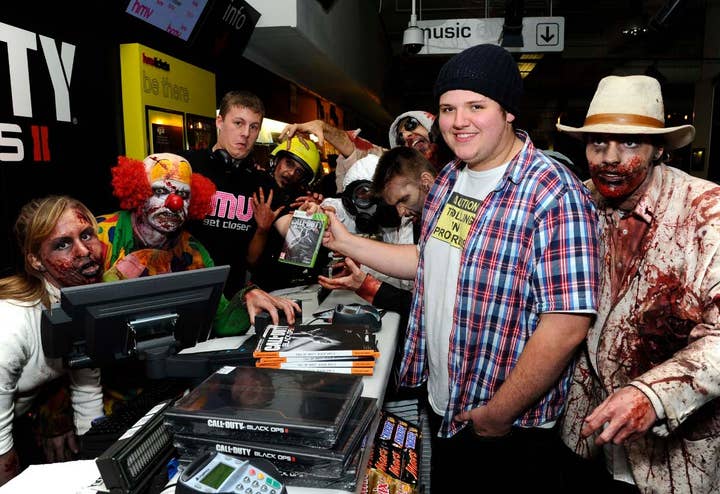Black Ops 2 and the future of Call of Duty
As the latest game launches worldwide, Activision's Peter Hepworth and COD's most loyal fans ponder the future of the franchise
Right now, few companies do fan service quite like Activision-Blizzard, but then few companies have audiences as passionate as those for Call of Duty and World of Warcraft.
The UK launch of Mists of Pandaria was a timely reminder of the power that the industry's biggest brands hold over their acolytes. In the midst of retail woes, declining subscriber figures, and widespread concern over the long-term viability of the subscription model, Blizzard's MMO drew hundreds, perhaps thousands, of fans to the streets of London, standing in line for hours to attend an event for a game that most of them had already purchased online. Only a small handful of the industry's products inspire such enthusiasm, and Activision-Blizzard has at least two of that select group.
The other, of course, is Call of Duty, though the line outside the Oxford Street branch of HMV for the launch of Black Ops II is less impressive than that for Mists of Pandaria by an order of magnitude. Not that it matters too much, of course: even if Black Ops II doesn't break records like its predecessor, it's certain to generate more revenue and column inches than anything else released this year, Pandaria included.
And if you're looking for fan devotion, it's sitting in a tent at the very front of the queue. Taylor Pelling, 19, has been waiting for the big moment since Wednesday, a full six days before I approach him to discuss the game for which he is putting his life on hold. Evidently, his sacrifice is less for Call of Duty and more for the studio that the series' fans once snubbed: Treyarch.
"Taylor Pelling has been waiting for the big moment since Wednesday, a full six days before I approach him to discuss the game for which he is putting his life on hold"
“For me, it feels like Treyarch always try to bring something new to the table, whereas Infinity Ward just rehashes old designs,” he says. “Honestly, I'm not a big fan of Infinity Ward. I bought Modern Warfare 3 and returned it two days later - I didn't like it, so I went back to World At War and Black Ops.”
For Taylor, the key distinction is in the multiplayer. When it was first handed half of the Call of Duty franchise, Treyarch was treated with no small measure of suspicion by die-hard followers of Infinity Ward. That has changed. The fact that Black Ops is still more popular online than Modern Warfare 3 - a game released a full year later - is testament to how much fans have warmed to the one-time interloper. Treyarch not only added the enormously popular zombies mode to the mix, it has also proved more consistently innovative in the franchise's all-important multiplayer modes.
“The times when I play campaign are the times when my internet goes down - that's it,” says Pelling. “I go straight to multiplayer.”
This is a more provocative point than it may first appear. When online play is your only focus - as it is for so many lining up for Call of Duty - the need for annual sequels diminishes. If Black Ops II fails to find the right mix, as Modern Warfare 3 did, Taylor will have no hesitation in returning to Black Ops post haste, with only the absence of any new map packs to deter him from doing so - a factor, it should be noted, that has as much to do with Activision's product strategy as it does the needs and desires of Call of Duty players.
Indeed, Taylor tells me that he wouldn't mind if the campaign disappeared altogether, and while not everyone would agree with his view, the overwhelming majority of people here tonight aren't among them.

“I don't play single-player,” says Mark, who has been an avid fan of Call of Duty since the epochal Modern Warfare. “Just online, all the time. I played the single-player on one game, and no, I just went straight back to multiplayer.”
For Mark, Call of Duty isn't about scripted conflicts, real or imagined, past or present; it's about competing online against friends, it's about trying to be the best, it's about prestige. This hasn't always been the series' focus - as those who remember the early Call of Duty games will attest - but its swelling community has moulded it into a very different experience: one that only exists online for the majority of players, that is more about constant digital updates than plastic boxes on shelves, that has as much in common with World of Warcraft as Call of Duty 2.
When asked about the appeal of a Call of Duty that abandons the campaign to focus on updating its multiplayer and Zombie modes on a more regular basis, Mark is clearly keen. Indeed, he would even seriously consider paying a subscription if it meant more consistent content and less queuing in mid-November.
“[A subscription game] makes sense,” he says. “If there was a lot of new content I wouldn't mind paying £10. At the end of the day, I spend that on Netflix, and I put much more time into playing Call of Duty.”
"The times when I play campaign are the times when my internet goes down - that's it. I go straight to multiplayer"
Taylor Pelling
And he isn't alone. Bobby Kotick's cheeks would flush with excitement if he could hear the endorsements of a subscription-based Call of Duty from so many here. Of course, the prospect of such a move is very different to the reality of committing to a monthly payment, but the fans' enthusiasm speaks loudly and clearly of how the community now sees Call of Duty. They have turned the franchise into a multiplayer experience where a subscription is feasible, even desirable.
Michael, who also started following the series with Modern Warfare, is similarly dismissive of the campaign modes, and would be standing outside HMV even if Black Ops II was just multiplayer and Zombies. In his view, these are the parts of the game that Activision has most confidently encouraged and built its community, exemplified by the Call of Duty Live event that has been running all weekend in the nearby Bloomsbury Ballroom.
“That's the height of the experience, and that's what the fans are really looking for,” he says. “When they started doing all this... they really raised the level, and took it to new heights. Some other games do things like this, but really, it's only Call of Duty. They put everything into it. They do a lot for the fans.”
According to Peter Hepworth, managing director of Activision's operations in the UK and Ireland, making these fringe aspects of the Call of Duty experience a more important part of the overall strategy is a now a major focus. Black Ops II is the first game in the series to allow players to broadcast gameplay and commentary live in YouTube. Potentially, this could open up the game to an even bigger audience.

“Arguably, the most fun this year is the e-sports angle,” he says. “It's already fun to play and now it's fun to watch. If we don't innovate, that's the risk.
“The event this weekend, Black Ops Live, was a first-to-play opportunity, and there hasn't been a spare seat since it opened. I think the YouTube streaming will open up [the breadth of the franchise]; where people see it as a competitive event but not necessarily as spectator sport, this is going to open that up. It does broaden e-sports from something that is quite niche right now... We're very open to facilitating the technology side, principally driven by users. There are already prize competitions and that will continue.”
According to Hepworth, there's “no limit” to where the franchise could go, eventually spanning both different genres and different media. For the core game franchises, though, many have pontificated on the possibility that Call of Duty may have already passed its peak, largely due to Modern Warfare 3 failing to outsell Black Ops. If there is any credence to these claims, it will be strengthened or demolished by the eventual sales of Black Ops II. Nevertheless, it is difficult to see how the series could significantly expand its audience through shooter games alone. Indeed, Hepworth tells me that Black Ops II is the most widely distributed game Activision has ever released: supermarkets, petrol stations, convenience stores; Call of Duty now reaches places that few games ever have.
"Arguably, the most fun this year is the e-sports angle. It's already fun to play and now it's fun to watch. If we don't innovate, that's the risk"
Peter Hepworth, managing director, Activision UK and Ireland
For Oliver, one of the few people waiting outside HMV who can remember a time when Medal of Honor was king of the hill, the level of Call of Duty's popularity could soon become a weakness. Oliver buys the game every year, but over time the sense that the campaign is the only aspect of the package that justifies an annual retail release has grown and ossified. The fact that so many people play Black Ops over Modern Warfare 3 proves the eminence of multiplayer, but it also undermines the reasoning behind Activision's relentless production schedule.
“They have a way of churning it out,” he says. “Sequels are supposed to be much bigger and better, but I fell that, with Call of Duty, they're like, 'Yes, here's a completely new single-player campaign, but we're just going to tinker with the multiplayer.' It's a tease.
“People [buy it every year] because they don't want to be left out. They want to blog, go on forums, get involved with memes... As a franchise, it sells because of the multiplayer, but that's where they most let the people down. We get new weapons, new maps and a couple of new modes, but a sequel should be better than what came before, not just different.... I mean, they're still using the same engine.”
It's hard to say when Activision will deem significant change necessary to the future of the franchise, or what the result would be if it decided to be so bold. Consumers can greatly reward innovation, but they often move elsewhere to find it, leaving past favourites to fade into obsolescence. The next world-leading MMO is likely to be free-to-play, for example, but it's unlikely to be free-to-play World of Warcraft. The same could be true of Call of Duty.
“Call of Duty's popularity could be its downfall,” Oliver says. “They've got the franchise, they've got the people, they've got the money, and now they've got to keep it up and raise the bar even higher.
"The question is, where are they going to go next?”

